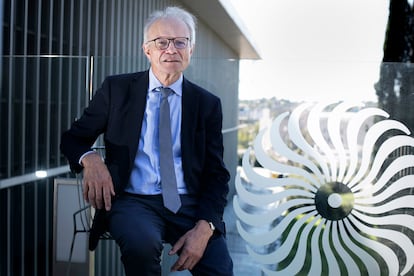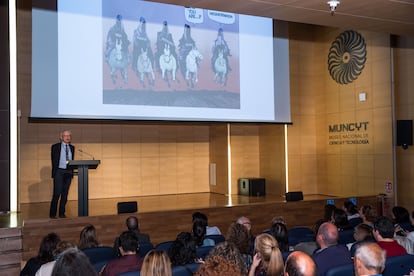Jonathan Osborne, a renowned expert in education, thinks that schools often fail to convey the wonders of science
The Professor Emeritus at Stanford University’s Graduate School of Education has long warned about the global shortage of scientific professionals

Dr. Jonathan Osborne, Professor Emeritus in Science Education at Stanford University, defends “the professionalism and specialization of experts in the post-truth era.” In the face of individualistic discourses, where access to knowledge has led some people to believe that they are alien to others, the professor warns that we still need an infinite number of professionals versed in their subjects. Osborne, who was the chairman of the think tank responsible for developing the OECD’s framework for assessing the scientific knowledge of students in over 100 countries, has been a teacher for decades.
After graduating in physics, he went into teaching, both at secondary and university level, at King’s College London in the U.K. His research focuses on finding the best methodology to teach science, technology, engineering and mathematics (STEM). The professor sat down with EL PAÍS at the National Museum of Science and Technology in Madrid to share his thoughts on science education in today’s environment
Question. What role does science play in today’s society?
Answer. We depend epistemically on the skills of scientists, just as we do on plumbers and doctors. Our scientific understanding of the world is one of humanity’s greatest intellectual achievements. I wish that more people would be able to explain why this is the case. For example, anyone would be able to briefly explain why Shakespeare or Cervantes are great writers… but is it so easy to do this when talking about scientists? This is a problem, because it means that we have failed to communicate the achievements of leaders in the field.
Q. What is lacking in science education in schools?
A. I think there is a big problem with teaching science. I wrote a report on it a long time ago: the average student goes to a 50-minute class, learns one scientific fact, comes back a week later and is taught another. What young people learn are the building blocks of scientific knowledge… but they aren’t able to see the big picture at all. The only people who really get to see inside the building are those who continue to study and become scientists.
Science education starts from the wrong place. Education must start from the point of view of questions about the world… However, most textbooks tell you the facts, but not what they are answering.
Q. Do you think that the popularization of scientific knowledge — say, via individuals putting out content on social media — has been positive?
A. Yes! Science teaching in schools should take more into account the “wow” factor. Think of the idea that your life exists for 70 to 90 years and that you are one of billions of people on Earth, on this little planet that is orbiting the Sun… That’s amazing. Traditional education often fails when it comes to transmitting the sense of wonder in science.

Q. What can we do to combat false beliefs that contradict science? Such as, for example, the notion that climate change isn’t real, the belief that the Earth is flat, or the perception that all vaccines are harmful?
A. You shouldn’t tell someone that they’re incorrect. No one likes to hear the phrase “you’re wrong.” You must interact, listen to their reasoning and then present them with information that contradicts them, because they’re being selective with their data. It requires a lot of patience. The first thing you have to do — something that is very key in education — is demonstrate intellectual humility. This is a much stronger position from which to approach breaking down false beliefs. Knowing the correct answer isn’t enough: you need to be able to explain why the incorrect answer is wrong. Also, from a political standpoint – even if you find it offensive – you have to know the arguments of the other side. There must be dialogue; this is a long-term project.
Q. In science, by definition, there is always the chance that fellow scientists will prove you wrong. Does that make you humble?
A. Sure, but science is also very competitive. There’s pressure to grow in your career, publish, win grants. As a scientist, you want to be proven right and you want your discoveries to be significant. That’s just human nature.
Thankfully, the scientific community invented the peer review model, which, while not perfect, helps ensure that whatever is published has some relevance. Community and consensus are part of the process.
Q. How do you communicate uncertainty, when a truth is partial or probabilistic?
A. We give students complex information — messy data — so they can understand how convulsive reality is. We explain the methodology on how to reach agreements, discover trends, isolate outliers and eliminate noise when building a data set. Thus, we explain that it is necessary to explore the nature of uncertainty, rather than simply providing an answer. We must invite students to theorize: why should we trust science? Should we believe the data we have access to? This serves to teach them that they should always check their sources.
Q. How can we get more people to have trust in scientists?
A. First of all, you have to assess the expertise of the scientist. Who claims this is a recognized professional? You have to check that they are active and working in a recognizable place, such as a university or a research center. We must also know if the scientist who is speaking is actually knowledgeable in their particular field — an immunologist is not an expert in agriculture. That’s why the term “scientist” as a general label creates problems: it’s a very specialized profession.
Q. Surveys show a pronounced decline in the interest that people display in the sciences as they grow older.
A. It’s a pretty universal reality. People think we live in a scientific and technological society, but that’s not true: we live in a humanistic society. People like to interact with other people, to hear what they do and see how they act. The sciences often don’t offer this.
Another reason for the decline in interest over time is that, if you present science as a bunch of fixed, established facts on which one can have no influence or opinion, a person will quickly lose interest. The French physiologist Claude Bernard, who lived in the 19th century, said that science “is a superb and dazzling hall, which may be reached only by passing through a long and ghastly kitchen.” If you don’t offer students something impressive — if you don’t offer them wonder and connections — why should they care?
Sign up for our weekly newsletter to get more English-language news coverage from EL PAÍS USA Edition
Tu suscripción se está usando en otro dispositivo
¿Quieres añadir otro usuario a tu suscripción?
Si continúas leyendo en este dispositivo, no se podrá leer en el otro.
FlechaTu suscripción se está usando en otro dispositivo y solo puedes acceder a EL PAÍS desde un dispositivo a la vez.
Si quieres compartir tu cuenta, cambia tu suscripción a la modalidad Premium, así podrás añadir otro usuario. Cada uno accederá con su propia cuenta de email, lo que os permitirá personalizar vuestra experiencia en EL PAÍS.
¿Tienes una suscripción de empresa? Accede aquí para contratar más cuentas.
En el caso de no saber quién está usando tu cuenta, te recomendamos cambiar tu contraseña aquí.
Si decides continuar compartiendo tu cuenta, este mensaje se mostrará en tu dispositivo y en el de la otra persona que está usando tu cuenta de forma indefinida, afectando a tu experiencia de lectura. Puedes consultar aquí los términos y condiciones de la suscripción digital.








































